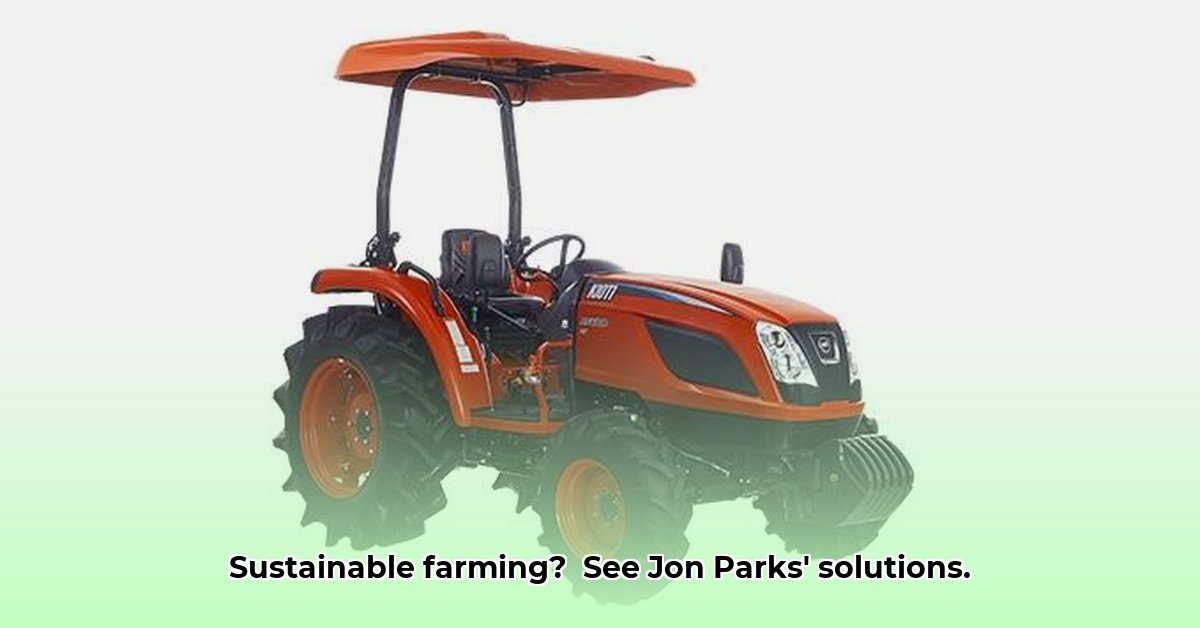
Understanding Jon Parks Tractor's Role in Lancaster, NH's Agricultural Landscape
Jon Parks Tractor, a well-established business in Lancaster, New Hampshire, serves as a vital link in the local agricultural community. For added comfort while operating equipment, check out these tractor seat cushions. While specific details regarding their sustainability initiatives are limited, their reputation for providing a wide range of equipment and personalized service suggests a significant potential for positive environmental impact within the region. Their journey toward more sustainable practices could serve as a compelling case study for rural businesses across the country. This article examines the challenges and opportunities facing Jon Parks Tractor and proposes concrete steps to enhance their contribution to sustainable agriculture.
The Challenges of Sustainable Agriculture Equipment in Rural Settings
A major hurdle for Jon Parks Tractor, and indeed for many rural businesses, is the limited availability of data on the sustainability of agricultural equipment. Many manufacturers focus on large-scale operations, leaving smaller farms with fewer choices for eco-friendly machinery. This lack of transparency makes informed decisions about sustainable practices incredibly difficult. How can farmers accurately assess the environmental impact of a piece of equipment when reliable data is scarce? Furthermore, even if suitable equipment exists, the high initial cost can be a significant barrier for smaller farming operations. The financial burden is often considerable compared to the available budgets of smaller businesses. This is further compounded by the need for specialized skills in the operation and maintenance of sustainable equipment.
Opportunities for Jon Parks Tractor to Lead the Way
Despite these challenges, Jon Parks Tractor possesses a unique opportunity to become a leader in sustainable agriculture equipment within the Lancaster region. Their deep understanding of local needs, coupled with their existing customer relationships, allows them to bridge the gap between sustainability and practical farming demands. They are uniquely positioned to offer solutions tailored to the specific challenges of the local farming community. For example, a focus on smaller, fuel-efficient tractors or specialized tillers could greatly benefit local farmers while simultaneously reducing environmental impacts. This local knowledge affords them a competitive advantage when engaging with farmers and building stronger connections with the community.
Actionable Steps for Sustainable Success
Jon Parks Tractor can capitalize on this opportunity through a strategic, multi-phased approach focusing on both short-term and long-term initiatives.
Short-Term Actions (Within the Next Year):
- Conduct a Comprehensive Customer Needs Assessment: Through detailed surveys and interviews, identify the specific sustainability concerns and equipment preferences of local farmers. Understanding their needs directly will steer purchasing decisions toward more effective and sustainable options. This will also help clarify needs and preferences regarding potential equipment upgrades.
- Establish Strategic Community Partnerships: Collaborate with local agricultural organizations and farmer co-ops to build trust and raise awareness of sustainable agriculture equipment. This collective awareness campaign will enhance market acceptance further.
- Actively Explore Funding Opportunities: Research and apply for government grants and incentives that support sustainable agriculture initiatives. Several state and federal programs offer funding for eco-friendly equipment purchases.
Long-Term Actions (3-5 Years):
- Develop a Comprehensive Sustainability Plan: Create a detailed plan that addresses equipment selection, vendor relationships, employee training, and marketing strategies. This plan should encompass environmental, economic, and social considerations. This commitment showcases a long-term commitment to sustainability.
- Establish Partnerships with Sustainable Equipment Manufacturers: Develop relationships with manufacturers committed to sustainable production and environmentally friendly designs. Careful vendor selection is critical for ensuring the long-term success of this initiative.
- Invest in Farmer Education and Outreach: Conduct educational programs and workshops to help farmers understand the benefits of sustainable equipment and practices. Providing accessible information fosters broader adoption across the board.
A Collaborative Approach: The Role of All Stakeholders
Achieving broader sustainability requires cooperation among all stakeholders. Farmers must embrace sustainable practices; manufacturers must prioritize eco-friendly designs; and government agencies must provide support and incentives. Jon Parks Tractor’s success hinges on its active participation within this broader agricultural ecosystem and will, in turn, positively benefit the entire community.
Conclusion: Building a Sustainable Agricultural Future
Jon Parks Tractor has the potential to be a significant catalyst for sustainable agriculture in Lancaster, NH, and beyond. By implementing the recommended strategies, the company can achieve growth while establishing itself as a leader in environmentally responsible practices. This requires a proactive approach, meticulous planning, and strong community engagement. The future of farming in the region depends on our shared commitment to creating a truly sustainable agricultural system.